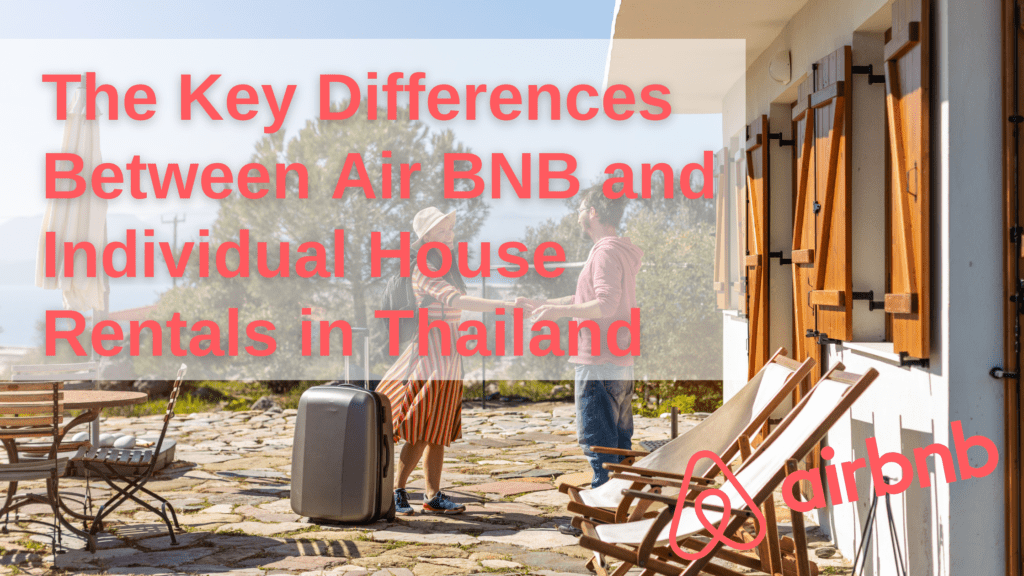There is a dime a-dozen rental options for foreigners who travel to Thailand and seek both short-term and rental condos, villas, and townhouses. Choosing from the best of these options within your budget and according to your destination can be a mammoth task especially if you do not have all the facts about the matter.
Thailand’s tourism is a multi-billion-dollar business, with hotels and condotels taking a lion’s share of the revenue through short-term rentals. However, for long-term rentals especially for people who do not want a typical hotel stay arrangement, there are a few more viable options that work out in their favor.
One of these options is to stay in an AIR BNB condo for a month or more, while the other is to rent out a house to enjoy, peace, and privacy in a no-fuss arrangement. Continue reading to know the key differences between AIR BNB in Thailand versus renting out individual condos or flats.
Legal Implications of Renting Out an Air BNB in Thailand
Air BNB has revolutionized the concept of renting out private property for short rental periods. While the impact of this tech conglomerate is massive, a little-known fact is that AIR BNB rentals are illegal in Thailand. Under the Thai Condominium Act as well as the Thai Hotel Act, unlicensed rentals in private condos can disrupt the peace of the neighbouring condo owners which can have legal repercussions. More importantly, Air BNBs in Thailand are infringing on the revenue earned by hotels and this is taken as a serious offence in the kingdom especially if reported by neighbours.
While many landlords who rent out their condos, villas, and townhouses to guests may argue that the Hotel Act has limitations and the outdated laws do not apply especially if neighbours are not disturbed by guests, things can change quickly if guests do not behave as per the condominium complex’s laws.
If caught then landlords can face jail time of 1 year and a fine capped at Thai Baht 20,000. Usually, first-time offenders escape jail time but end up paying the fine, yet if jailed then this stays on their permanent record as a criminal offence. While the majority of the implications of renting out a condo through an unlicensed Air BNB are for the landlord, this could also mean that you as a tenant can be evicted at any time without getting a refund for the stay that you have paid for.
Exceptions for House Owners That Offer Air BNB Services
According to the Hotel Act, house owners with condos in Thailand may be allowed to rent out their condos, at least in terms of technicality and if not policed by neighbours that report. These exceptions state that a hotel license is not required by law if the condo has 4 rooms or fewer if the property can accommodate less than 20 guests and if renting the property is not the primary source of income for the landlord.
Rules and Regulations for Staying at Air BNBs in Thailand
In case you do find an Air BNB host who likes to take risks and live on the wild side, then there are a handful of rules and regulations to follow. For instance, as a tenant you cannot get any guests over, especially those of the opposite sex as this might become a nuisance for neighbors with families.
Moreover, you may have a check-in time and check-out time to adhere to strict and this includes the time you return home at night after enjoying a day out in the city. Most condo managers in complexes keep a watchful eye out for landlords breaking the “no commercial activity by letting out condos for a short duration” rule. If caught, they must report this to the police for immediate action.
Note – If in doubt, consult a realtor and a legal aid with in-depth knowledge of Thai laws, before risking paying in advance to Air BNB and other such new-age short-term rental options that may just get you in trouble.
Renting Out An Individual House In Thailand
Foreigners who visit Thailand on any visa even a short-term 60 days visa can rent out a house legally in their name. To do this they would need both a copy of their passport and the original for verification by the landlord. Additionally, foreigners have to pay a two-month advance security deposit and pay the first month’s rent in advance to the landlord.
While having access to a local bank account isn’t mandatory, it is always good to open one in your name while in Thailand.
Benefits of Renting Out An Individual Condo in Thailand
No Prying Eyes – If privacy matters to you, then choosing an individual condo is the best bet for you. The majority of the luxury condo units in developed areas have private pools, saunas, and gyms as well, which is a bonus for tenants who do not want to spend more on fitness solutions at public gyms.
Freedom and Peace of Mind – If freedom to do your own thing as per your timings such as returning late from clubs or office is important for you then renting out an individual condo is a good move. If you tend to lean towards entertaining guests at your place in your zone of comfort then taking up an individual rental condo in Thailand is a wise move. Making sure that your landlord is fine with you returning at odd hours and entertaining guests within a reasonable limit may not be mandatory but mentioning this perhaps once is a good safety net. Keep in mind that you and your guests would be required to maintain a lower decibel of music at night and not disturb the neighbors to enjoy staying in the same place for a long time.
HouseKeeping Choices – If you are looking for housekeeping services and do not mind paying a nominal amount for this then individual condo rentals may work well for you. You can get both basic solutions for merely vacuuming and comprehensive deep cleaning solutions for carpets, drapes, and furnishings. You can also choose to hire a cook, or chef, have an in-house maid and choose from a wide range of other maintenance choices if you rent a private condo in Thailand.
Shifting From One Rental Condo To Another
As long as there are no damages to the walls, furnishings, and fixtures, typically landlords in Thailand do not cut any amount from your security deposit when you leave. If the walls need a coat of paint at the time of your exit, then you can sponsor this and ask the landlord to fix up the walls on your behalf. In most cases for exiting any house, your landlord may ask you to either give one-month advance notice in writing or pay for it without staying in case you are in a rush to leave.
Make sure that all discussed terms and conditions are in writing through a legally abiding rental contract as this will safeguard your interests at the time of exiting the house. Domestic relocation services are in plenty, and with the help of a quick search, through the help of a trusted realtor, or word of mouth, you can get access to these services.
To Rent Or To Buy A Condo In Thailand?
If you are considering living in Thailand for more than a few years or if you want your property to pay for itself through long-term rentals after purchase, then it might be time for you to consider buying your condo in the kingdom of Thailand.
Silk Estate has been the choice for many foreigners looking to purchase luxury condos in Thailand in prime locations such as Bangkok, Koh Samui, Pattaya, and Phuket. To know more about how we can add value to your property purchase, contact us today.
You may be interested in this post >>> Things To Keep In Mind While You Buy A Condo in Bangkok.
You may be interested in this post >>> Top Pitfalls to Avoid When Renting a House in Thailand as A Foreigner




